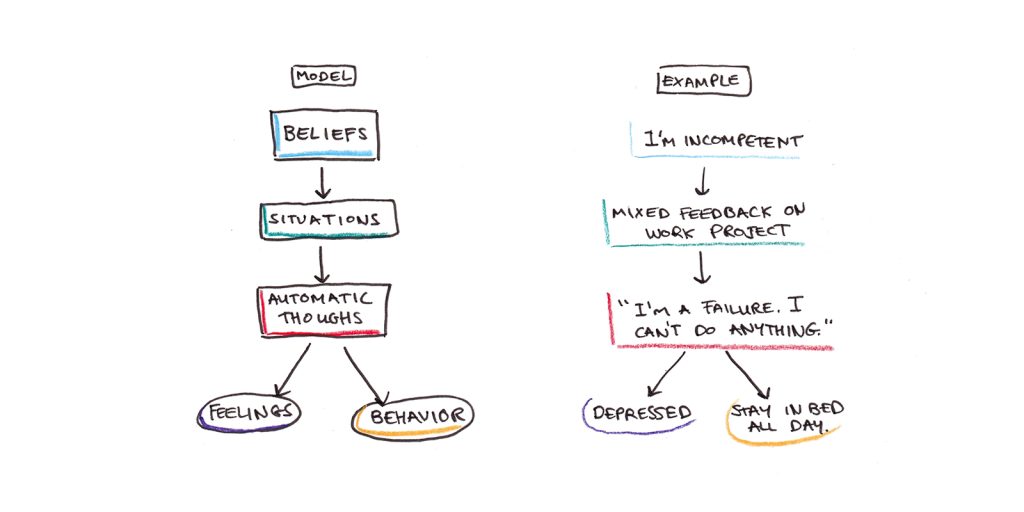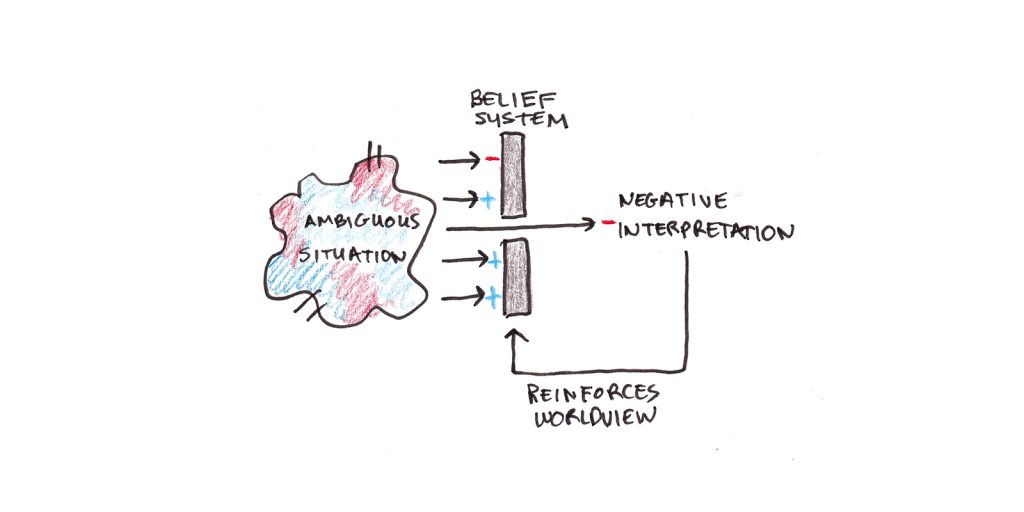Psychoanalysis, pioneered by Sigmund Freud, dominates standard impressions of remedy. Sufferers mendacity down on lengthy couches whereas an analyst dissects their desires for proof of repressed childhood trauma make for nice tv, however does it really work?
Within the late Fifties, Aaron Beck, a working towards psychoanalyst, determined to check a key idea of Freudian concept. Psychoanalysts defined despair as a masochistic drive—hostility turned inward towards the self. If that had been so, Beck would anticipate these themes to point out up in sufferers’ desires.
Nonetheless, when he scrutinized these desires, he didn’t discover masochistic imagery. Actually, his sufferers had fewer hostile pictures. As an alternative, he discovered themes of loss and rejection.
This failure of Freudian concept triggered Beck to query his whole self-discipline’s assumptions. If the speculation’s primary tenets couldn’t be demonstrated in experiments, how helpful was psychoanalysis?
Cognitive remedy was born out of this failure. Within the many years since Beck’s pioneering work, this mode of remedy has confirmed one of the vital efficient practices for treating despair, nervousness and plenty of different psychological afflictions. Cognitive-behavioral remedy (CBT) typically outperforms pharmaceutical medicine alone, and it has develop into the gold normal for psychotherapy.
What’s Cognitive-Behavioral Remedy?
The essential premise of CBT is that distorted considering causes psychological misery and dysfunctional behaviors.
On this mannequin, our beliefs trigger us to interpret ambiguous conditions particularly methods. These interpretations give rise to computerized ideas, verbalizations and pictures that rise to the extent of consciousness. These ideas, in flip, produce emotional reactions and behaviors.
For instance, think about a depressed one that has a perception that she is incompetent. When she receives a unfavorable efficiency evaluate at work, it triggers the automated thought, “I’m such a failure. I can’t do something proper.” The thought then causes her to really feel extra depressed, additional sapping her motivation to work.

Beliefs, ideas, feelings and actions can all be mutually reinforcing.
Even when the suggestions is a mixture of good and unhealthy, the depressive individual interprets it in a unfavorable gentle, triggering computerized ideas of failure that additional depress her temper and make it tougher for her to work. This additional entrenches the unique perception, making related interpretations extra probably sooner or later.

CBT encourages folks to note and query their computerized ideas. Then, they use reasoning and experimentation to check their beliefs and undertake extra lifelike ones. This course of results in more healthy considering, feeling and habits.
Recognizing Disordered Considering
Computerized ideas come up spontaneously, and we’ve no management over their content material. The purpose of CBT is to not deny these ideas; it’s to note them and topic them to scrutiny.
In a main practitioner’s information to CBT, Judith Beck (Aaron Beck’s daughter and disciple) lists quite a few disordered considering patterns individuals who endure from psychological misery steadily have interaction in:
- All-or-nothing considering, e.g., “I’m both a winner or a loser.”
- Catastrophizing, e.g., “If my companion leaves me, I received’t be capable of reside.”
- Ignoring proof for optimistic interpretations, e.g., “I solely handed the check as a result of I acquired fortunate.”
- Emotional reasoning, e.g., “I really feel like a failure, so I should be one.”
- Labeling, e.g., “I’m a loser.”
- Magnification/minimization, e.g., “A combined evaluate means I’m incompetent. Optimistic evaluations don’t imply something.”
- Psychological filter, e.g., “As a result of one individual on the occasion didn’t like me, I should be a loser.” (Even when different folks did such as you.)
- Thoughts-reading, e.g., “She thinks I’m an fool.”
- Overgeneralization, e.g., “I tousled the recipe. I can’t do something proper.”
- Personalization, e.g., “Susan canceled our plans as a result of she hates me.” (Ignoring that she may need had another excuse.)
- Crucial considering, e.g., “I ought to by no means make errors.”
- Tunnel imaginative and prescient, e.g., “He’s such an fool. He can’t do something proper.”
One of many central tenets of CBT is to not flatly deny these statements. Certainly, they’re typically partially true, and it’s that grain of fact that enables them to take deep root in our minds.
As an alternative, the therapist encourages sufferers to start to note these computerized ideas. Then, via a means of Socratic questioning, the affected person assesses their validity. Sufferers are requested to provide explanation why a perception is perhaps true, and likewise provide causes it may not be.
A good friend not replying to a textual content message may set off the thought, “She doesn’t like me. No person likes me.” However contemplating different potentialities, “Possibly she is busy?” or remembering that she helped you progress final yr and invited you to a celebration lately, will help you to query the validity of that perception.
Motion Plans: The “B” in CBT
Whereas cognitive remedy was initially formulated to deal with disordered considering, it has since merged with habits remedy, which focuses on the dysfunctional actions folks take.
Contemplate nervousness. A socially anxious individual begins to really feel anxious when requested to current at work. All month, he sweats over the proposed presentation, lastly asking his boss to search out another person to do it.
Avoiding his nervousness, nevertheless, has two main penalties:
- The reduction he feels in not having to do the presentation reinforces his habits. Like a rat rewarded for urgent a lever, the motivational a part of his mind is inspired to search out methods to keep away from presenting sooner or later.
- By not presenting, he by no means will get to see if his emotions about presenting had been correct. He could have believed he would have been humiliated, however he’ll by no means get disconfirming proof that such an final result was unlikely.
Motion plans and behavioral experiments designed to check the validity of beliefs are central to CBT. These are particularly necessary for depressed sufferers, whose sickness makes even doing easy chores or self-care extremely troublesome. By taking small actions, you pry open a niche between the self-sustaining suggestions loop depressive ideas and inaction generate.
Does CBT Work if You Don’t Have Despair or Anxiousness?
One factor that struck me whereas studying the analysis on CBT was how a lot of it appears related to wholesome psychological functioning, usually, and never simply excessive instances of hysteria or despair.
In case you squint at it, quite a lot of the recommendation in CBT reads like one thing straight out of a self-help guide: take motion, even for those who don’t really feel prefer it; visualize your intentions; set objectives; train; and construct habits to strengthen your motivation. That is perhaps as a result of CBT is just widespread sense (in that case, then it’s stunning it’s no more extensively adopted). However I additionally suspect that CBT-informed theories and language have leaked out into the broader tradition. Anybody studying therapy-adjacent standard books will find yourself absorbing a few of it.
Studying the classes of disordered considering, I used to be struck by how typically I may consider examples in my very own ideas: Reflexively blaming a scarcity of reply from a good friend on a damaged relationship (moderately than busyness) or emphasizing the few crucial emails I recover from the overwhelming majority of optimistic ones. I don’t consider myself as depressed or anxious, however I can see the parallels between my considering at occasions and people of Beck’s sufferers.
What’s The Lively Ingredient in CBT? The C or the B?
As talked about above, CBT, as an entire, is without doubt one of the only types of remedy. It’s the gold normal for a purpose.
However CBT isn’t a particular method. As an alternative, it’s a framework for occupied with psychological issues that comes with many alternative strategies. Publicity, mindfulness, speculation testing, self-acceptance, problem-solving, goal-setting and different concepts all fall into the CBT umbrella.
Thus, which parts of CBT underpin its effectiveness remains to be an open query. One debate considerations whether or not the energetic ingredient in CBT is the work of perception change—the noticing of computerized ideas and subjecting them to a form of rational evaluation, or whether it is direct behavioral change that makes CBT so efficient.
Analysis on publicity remedy for phobias, PTSD, and nervousness, as an illustration, has discovered that publicity alone performs roughly in addition to publicity plus cognitive remedy. Speaking about why you shouldn’t be afraid might not be as necessary as merely exposing your self to your fears and letting them subside.
Equally, whereas depressive sufferers get caught in disordered patterns of considering, additionally they get caught in patterns of dysfunctional habits. Staying in mattress all day, not exercising and failing to maintain up with primary life duties could make despair worse. Maybe the worth of CBT lies extra in its capacity to push folks to take motion, even when they nonetheless really feel awful.
Can You Self-Administer CBT?
One other query that percolated in my thoughts whereas studying about CBT was whether or not it’s related to self-improvement. Almost the entire analysis performed has taken place within the context of formal remedy. Whereas I did see some analysis involving casual or self-conducted CBT, it’s too scanty to deserve the identical evidence-based label that therapist-conducted CBT deserves.
It’s a worthwhile query to ask as a result of there’s a specific problem in questioning your individual beliefs. Socratic dialog with a therapist will help you uncover particular, maladaptive thought patterns and beliefs. In distinction, there’s something nearly paradoxical about questioning sincerely held beliefs; for those who already knew a perception was false, you wouldn’t maintain it within the first place.
Habits change could also be a extra useful locus of change for self-directed enchancment. It escapes the rational perception paradox above, and behavioral experiments can expose you to new proof that undermines flawed beliefs.
Nonetheless, given the fee and issue of acquiring psychological well being assist and the truth that many individuals’s difficulties don’t rise to the extent of a scientific dysfunction, I feel understanding the framework CBT presents will help us reside happier and extra productive lives.
_ _ _
Additional Studying:

